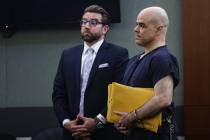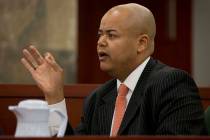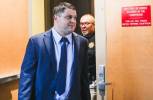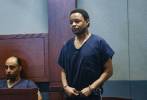Coroner’s inquests adding up
Nine months have come and gone since the last coroner's inquest, and many more will likely come and go until the next.
The constitutional challenge filed last month by three Las Vegas police officers facing the first revamped inquest means an indefinite delay of the public hearings into police-related deaths.
With no inquest in sight, frustrated public officials are searching for ways to clear the growing inquest backlog and get officers awaiting inquests back to full duty during what could be a lengthy legal battle.
"We've got to get this thing moving," County Commissioner Steve Sisolak said. "It's just incredibly unfair to the families and the officers to let it go this long."
The coroner's office has 14 inquests on hold, a number that climbs with every new fatal police shooting or in-custody death. And that number will likely more than double by the time the legal battle ends months or possibly years from now, pushing any attempt to catch up into 2013 or beyond.
"They're backing up so far, and there's no end in sight," Sisolak said.
The last inquest was held Oct. 21, just as county commissioners began mulling changes to the inquest following two controversial police shootings. A committee of lawyers, police, the coroner and activists recommended changes to the public hearing, which had been criticized as being too favorable to police.
In January the commission approved a number of changes, including the appointment of a lawyer to question witnesses on behalf of the dead person's family.
The first revamped inquest was set for July 12, but it was postponed after the three officers scheduled for the inquest filed the legal challenge. They contended the addition of the ombudsman transformed the fact-finding hearing into an adversarial one and violated their constitutional rights to due process.
Police unions throughout the valley backed the challenge.
"We're saying this process is not fair to ... anybody carrying a gun and a badge in this town," said Chris Collins, head of the Police Protective Association, which represents about 2,800 rank-and-file Las Vegas officers.
The challenge was filed in state District Court, and county lawyers moved it to federal court. Observers believe it will take at least six months for a decision followed by months of appeals.
"It's extremely frustrating," County Commissioner Chris Giunchigliani said. "I'm especially worried about the families being caught up in this legal gamesmanship."
She said the inquests should have gone forward despite the legal challenge. The police officers could have refused to participate by invoking their Fifth Amendment right against self-incrimination while the rest of the process continued, she said.
That would have allowed closure for families and officers while helping police and government officials identify training and policy shortcomings that could be addressed to prevent future shootings, she said.
"If people want to sue, fine, but it shouldn't stop our process," Giunchigliani said.
Sisolak said the legal challenge shouldn't be a surprise, since the valley's police unions fought the ombudsman addition from the beginning and threatened to stop participating in inquests if it was approved.
Sisolak, who voted against appointing an ombudsman, said he planned to put the inquest backlog on the Aug. 2 commission agenda. With no timetable for a return to the inquests, he suggested something should be done in the interim, possibly taking the cases to a grand jury.
"The family needs closure, and so does the officer," he said.
Sheriff Doug Gillespie, who supported the new inquest system as a way to restore public faith in the system and maintain transparency in fatal police shootings, said he is frustrated by the delays and cannot wait for the court fight to end before getting his officers back to full duty.
His Metropolitan Police Department has 14 officers awaiting inquests.
"I don't think we should sit around and wait if there's something else we can do," he said.
Historically, officers involved in fatal shootings or in-custody deaths were put on paid administrative leave until they were cleared by an inquest jury and then an internal use of force board. With no inquests in sight, Gillespie said he plans to move up the use of force board reviews and not wait for inquests before returning officers to full duty.
Those officers have been on modified duty, typically desk jobs with no contact with suspects.
"I've been patient long enough," Gillespie said.
Although he supports the officers' legal rights to challenge the inquest, Gillespie said he would like to see a few inquests go forward under the new rules to see how they work and tweak them, if necessary.
The inquest provides transparency to the public and gives officers the chance to tell their side of the story, he said.
"The public realizes these men and women have a very difficult job to do and at times have to make split-second decisions," Gillespie said. "I think what the public would like is for us to explain why we do it."
Former District Judge David Wall, the lawyer appointed to represent the family of Benjamin Bowman in the first revamped inquest, said in decades of inquests police officers never objected to being directly questioned only by county prosecutors. It wasn't until the addition of the ombudsman that they fought the inquest.
"To me that just perpetuates the notion that the tough questions weren't being asked," Wall said.
Allen Lichtenstein, of the American Civil Liberties Union of Nevada, said he recognized the officers' legal right to challenge the inquest, but their legal argument "doesn't seem to be well-founded."
Collins, the police union head, said the inquest is broken and should be scrapped. Instead, the county should adopt the system used in most of the country where the district attorney's office reviews fatal police shootings and decides whether to file criminal charges.
Even if the coroner's inquest returned to its previous form without an ombudsman, Collins said he doubts officers would ever participate, especially since they face no repercussions if they don't.
"I think the damage has been done," Collins said.
District Attorney David Roger agreed that the inquests should end. He would prefer to review fatal shootings, make a decision and post every report and piece of evidence on a website for public review, he said.
The inquests have been a burden on his office, often requiring veteran prosecutors to spend hours of preparation time and one or two days in the courtroom. Under the revamped inquest, the time needed for both preparation and the hearing would only grow longer, he said.
With the increased burden and continuing budget restraints, Roger has moved his veteran prosecutors off the inquests and given the responsibility to law clerks from the appellate division. After a short transition period working with veteran prosecutors, the law clerks will handle all inquests.
Like others, Roger expects a lengthy legal battle over the inquest to create an ever-growing backlog that will overwhelm the system.
"I doubt we'll ever catch up" he said.
Contact reporter Brian Haynes at
bhaynes@reviewjournal.com or 702-383-0281.























